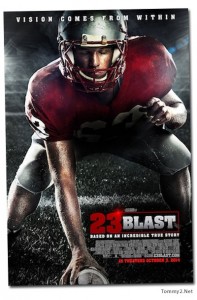Stephen Lang is best known for playing the villain in “Avatar.” But in “23 Blast,” based on the real-life story of Travis Freeman, a high school football player who lost his vision but stayed on the team, Lang plays a good guy, the coach who encouraged and supported him. I talked to Lang about acting and what it is like to play a real-life character you know will be watching.
I’ve seen you play a lot of bad guys and a lot of guys from other eras and it was really nice to see you playing just a regular nice contemporary guy. What was that like for you?
I didn’t give it a whole lot of thought, being nice or not nice, you know when I was still making this film, but when I watched the film I was like, “ Huh, what is it about this that…oh yeah, I am actually sympathetic. Wow.” And I realized, gee it’s kind of a while since I played someone who is not doing things bad things to people, so it is really quite a pleasure to watch.
From the very first scene, when you’re coaching the little kids, we see how decent and honorable your character is.
I love that scene. This is one of my favourite scenes in the movie. You know if you recall in this they were really little kids, you know. And the bench was kind of high and their feet didn’t even touch the ground; they all were in football uniforms. And we only had this one bench and it really was not a very long bench. And we had like eight or nine kids crammed down to the bench, right and I was kind of at the end of the bench. So if you were the kid furthest away from me you had to lean far out so we could see everybody. And there was a kid who leaned far back, he just tumbled off and fell on his head. Once we made sure he was okay, it was very funny, a kind of slow motion dance. It was what we would have called precious.
I had the pleasure of interviewing Dylan Baker last week, so I got his take on what it was like to be a first time director, but tell me about what it was like to work with him.
I’ve known Dylan and have really a lot of respect for him as an actor – as an actor’s actor. I was pleased to be asked to be part of his effort and I suspected that he would do a good job. I knew he would do a good job with the actors. And in fact, he did. And you know, he was well supported, I think from the technical side. I think he came into it knowing a certain amount but until you have actually directed, I mean so what. But he was really up to the task in that movie, it looks quite splendid. And I enjoyed working with him very much. We worked to fine-tune it together. He was very open to what I brought to it, and it was always very clear about stepping in and saying, “How about if we tune this, try this and everything.” I worked in concert with him. And I know that when I deal with him, I’m dealing with somebody who is intimately familiar with the whole process. So it was an altogether pleasurable experience.
When you take on a role like this, how much is what is on the page and how much is based on meeting the real person?
It really would depend on the project. If you were playing Bear Bryant for example, a coach who is nationally renowned, it would be really a wise thing to study very, very hard, understanding that the audience already has an expectation of the character. But Coach Farris is a wonderful guy, he is physically quite different from me and I met him during the filming and enjoyed meeting him but I felt there was enough on the page for me to work with and to create my version of who this coach was and hopefully he is satisfied. There are no historical imperatives for me to be concerned about. When I played Stonewall Jackson, you want everything dead on accurate as you can be or if you are going to make an alteration, you want to know you are doing it because it is a choice, maybe because dramatically it may better than the truth. There is a tremendous amount written and said about Jackson so we know. The same cannot be said of Coach Farris. Although down in Portland I think he is quite well known and anyway, a nice guy.
Did you play high school football?
Yes, and I was a center, like Travis in the movie. I had a coach who was a really good man and a really good coach, for football and lacrosse.
You have done a lot of theater. Can you tell me a little bit as an actor about what it is that you can do in a film role that you can’t do on stage?
I would say in film very often it is a question of mastering mechanical skills, whether it be hitting your mark while you are riding a motorcycle or jumping off something. Not that that doesn’t occur on stage but theatre is that experience that you shared that you’re having and it is there and it is gone. Film is just this recorded out of sequence moments.
What’s the best advice you ever heard about acting?
Hit your mark and tell the truth. One actor did say to me years ago something which I have thought of over the years, because you know it is a tough business, right? In the best of careers there are disappointments, things that you think are going to turn out great don’t turn out great – and along with the moments of joy and the actor said to me right at the beginning, forty years ago, he looked at me, he says, “Hey, remember this; get angry but don’t ever turn bitter.” That’s pretty good advice in a way, you know. And keep getting better, keep learning all the time because if you are standing still then you’re petrified in this business. That is why I have to play a role like this. It was cool for me because I can be the authority thing, the bad guy thing, I can be that. It is nice to get an opportunity to work with little kids or to play a more sympathetic role now and again.
What are you most proud of with this film?
It is a true story. And I think the thing that is most outstanding about it is that it is a film that could have been done in a less sensitive, way it could have come very perilously close to a kind of a cloying sentimentality. And I think that was avoided totally, completely. It is told simply and at times it is charming, at times it is highly emotional, at times it is quite funny. And it is told literally with an authenticity and an honesty and a simplicity that is very, very moving, a real testament to the filmmaker, to Dylan and to his editors and the choices that they have made.


